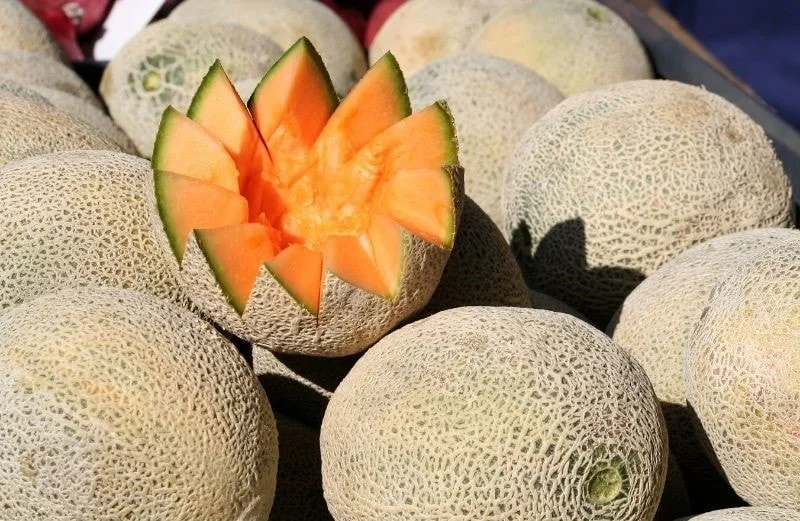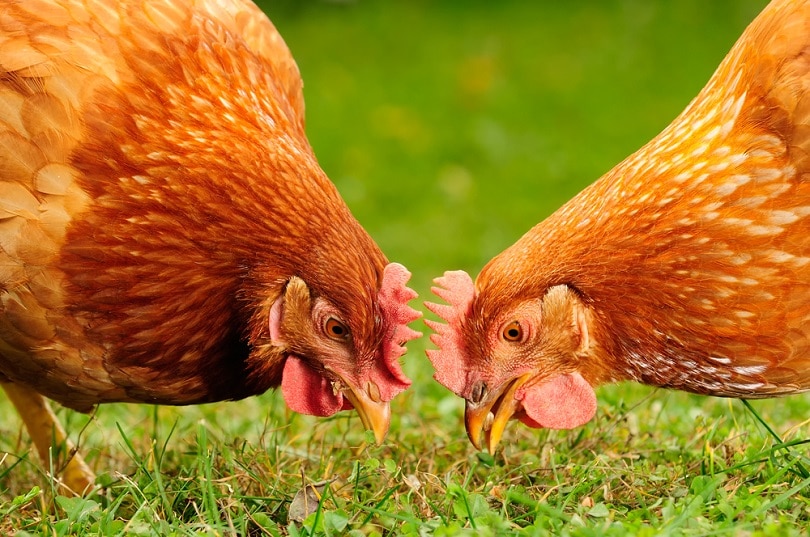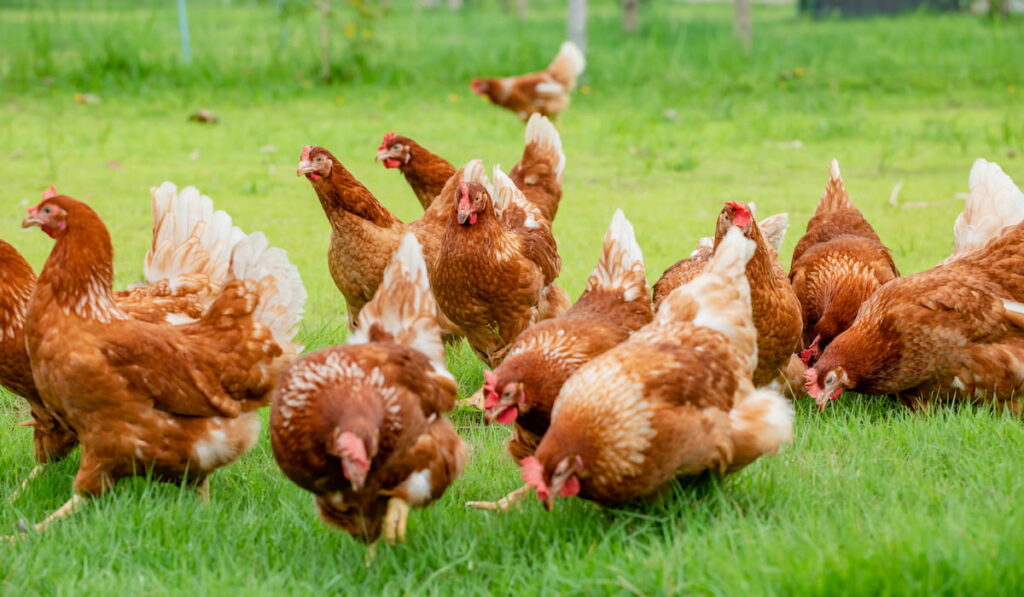Can Chicken Eat Cantaloupe? A Complete Guide for Chicken Owners
Imagine the lush green fields, bathed in warm sunlight, where a flock of chickens roam freely, pecking at the ground in search of nourishment. As you walk through this picturesque scene, a question arises in your mind: can chicken eat cantaloupe, just like humans do?
You ponder the possibility, aware that providing chickens with a well-rounded diet is crucial for their overall health and happiness. Though we often associate chickens with grains and seeds, their culinary preferences extend beyond these staple foods.
If you're embarking on a journey into the world of chicken keeping, seeking inspiration for delightful treats for your feathered companions, you may find yourself pondering the idea of incorporating fruits into their diet.
And so, let us embark on a captivating exploration into the realm of poultry nutrition and answer the intriguing question: can chicken eat cantaloupe? Together, we shall unravel the mysteries surrounding this delectable fruit and uncover how it can bring joy and nourishment to our cherished chickens.
People Also Read: Can Chickens Eat Avocado? A Complete Guide for Chicken Owners
**

Is Cantaloupe Toxic to Chickens?
Rest assured, cantaloupe is safe for chickens to eat and can be a delightful addition to their diet. It is a hydrating fruit that is low in calories yet rich in essential nutrients. So, can chicken eat cantaloupe? Absolutely! Chickens thoroughly enjoy and love consuming cantaloupes, especially during the summertime. However, it's crucial to introduce this fruit gradually and in moderation, just like with any new food, to prevent any potential digestive issues. Chickens are prone to dehydration, particularly in hot weather, so it's important to closely monitor their water intake. Fortunately, cantaloupes provide a refreshing solution that not only pleases human taste buds but also serves as a flavorful treat for your feathered flock. This makes them an ideal choice for combating thirst and dehydration in chickens, creating a perfect combination to keep your flock well-hydrated and content.
Benefits of Cantaloupe to Chickens
Cantaloupes pose no harm to your chickens and, in fact, rank among their favorite fruits. These juicy treats not only provide a safe option for your flock but also offer a plethora of beneficial nutrients, much like they do for humans. Here are the top benefits of cantaloupe to Chickens:
Hydration: Cantaloupe has a high water content, making it a refreshing and hydrating snack for chickens, especially during hot summer months. Providing them with juicy fruits like cantaloupe can help keep them cool and prevent dehydration.
Vitamins and Minerals: Cantaloupe is rich in vitamins A and C, both of which are beneficial for chickens. Vitamin A supports healthy vision, proper growth, and immunity, while vitamin C boosts their immune system and promotes overall well-being.
Antioxidants: Cantaloupe contains antioxidants that help combat harmful free radicals in the chickens' bodies. This can contribute to their overall health and potentially reduce the risk of certain diseases.
People Also Read: Can Chickens Eat Bread? A Comprehensive Guide for Poultry Owners
Can Chickens Eat Cantaloupe and Pineapple?
Yes, chickens can eat both cantaloupe and pineapple. Pineapple is another fruit that can be safely incorporated into their diet. It offers a sweet and tangy flavor while providing additional nutritional benefits. Pineapple contains bromelain, an enzyme that aids digestion and can support the chickens' gastrointestinal health when fed in moderation.
Can Chickens Eat Watermelon and Cantaloupe?
Watermelon is another popular fruit that chickens can enjoy. Like cantaloupe, watermelon has a high water content, helping to keep chickens hydrated. It also contains vitamins A and C, as well as antioxidants, making it a healthy treat option for your flock. Remember to remove the seeds and only offer the flesh of the watermelon to prevent choking hazards. People Also Read: Can Your Chickens Eat Grapes? Exploring Safety and Benefits
Preparing Cantaloupes for Your Chickens
Chickens have a fondness for cantaloupes and enjoy consuming them in various ways. While humans have numerous ways to eat cantaloupes, it's worth considering how chickens can benefit from prepared food.
With their robust beaks, one might assume that chickens can simply peck their way into cantaloupes, which is a viable option. However, it is still advantageous to prepare the food in a certain manner for the chickens' benefit. Chickens are not particularly picky eaters.
They tend to consume whatever is presented to them or what they perceive as edible. However, as poultry owners, there are better ways to handle their food. One simple way to prepare cantaloupes for chickens is to wash the fruit thoroughly.
Chickens are conscious of food cleanliness, so if it appears dirty, they may avoid it. Afterwards, the fruit can be sliced into bite-sized pieces. Once the fruit is cut, it's advisable to cool it in the refrigerator. This also makes the fruit more enticing, especially in hot weather.
It's important to note that once the cantaloupe is sliced, it should be consumed within 2-3 days to prevent harmful pathogens from proliferating. Another method of preparing cantaloupes for your flock requires more effort. You can peel the cantaloupe and dice it into smaller pieces for easier consumption by the chickens.
Surprisingly, chickens also consume the rinds and seeds of cantaloupes, wasting none of the fruit. The rinds can be prepared by drying them and mixing them with their feed or offering them as snacks. As for the seeds, they can be scooped out, ground or blended, and mixed with yogurt.
This combination is a favorite among chickens. While chickens are not particularly concerned about flavors or the visual appeal of their food, they do appreciate new tastes. Thus, incorporating fruity flavors like cantaloupe into their daily meals can make them more enthusiastic about eating and eager to try more.
People Also Read: Maximizing Profits: The Ultimate Guide to Broiler Weight Management
Other Fruits Chickens Can Eat
In addition to cantaloupe, pineapple, and watermelon, here are five other fruits that chickens can safely consume: Apples: Remove the seeds and core, and cut them into small, manageable pieces. Apples provide vitamins, minerals, and fiber. Berries: Strawberries, blueberries, raspberries, and blackberries are all safe and nutritious options. These fruits are packed with antioxidants and offer a flavorful treat for your chickens. Oranges: While chickens can eat oranges, it's best to offer them in moderation due to their high acidity. Remove the peel and separate the fruit into sections before feeding. Peaches: Remove the pit and slice the peach into small, chicken-friendly pieces. Peaches are a source of vitamins and minerals that can add variety to their diet. Pears: Slice the pears into manageable chunks, removing the core and seeds. Pears are a great source of fiber and provide essential nutrients for chickens. People Also Read: Research certified: Best 5 Organic Treatments for Coccidiosis in ChickensConclusion Chickens can indeed eat cantaloupe, and it can be a healthy and enjoyable addition to their diet. Cantaloupe offers hydration, vitamins, minerals, and antioxidants, making it a nutritious treat for your feathered friends. Remember to introduce new fruits gradually, remove any seeds or pits, and offer them in moderation. By incorporating a variety of fruits, such as cantaloupe, pineapple, watermelon, apples, berries, oranges, peaches, and pears, you can provide your chickens with a well-rounded and balanced diet. Keep in mind that while fruits are a valuable supplement, they should not replace the essential nutritional components of their regular feed. Always prioritize the nutritional needs of your chickens and consult a veterinarian or poultry expert if you have any specific concerns or questions regarding their diet.